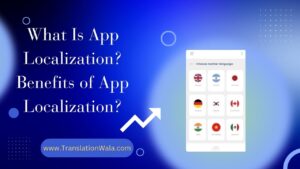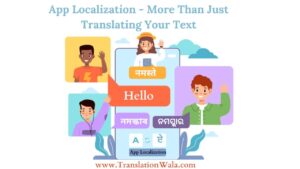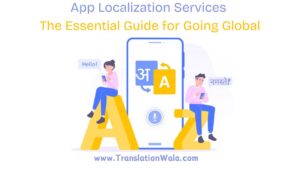App Localization: Mobile apps are the best thing in today’s world of constant connectivity. They’re always with us, helping us with daily jobs, making us laugh, and linking us to people all over the world. But in this wide range of situations, the success of an app often depends on one important thing: translation.
Think of App Localization, you remove language and cultural hurdles so that users all over the world can experience it as if it were made just for them. It’s not enough to just translate text; you also need to make changes to your app so that it works for a wide range of people, from different types of cash to different kinds of fun. You won’t believe it, but this very careful process is the key to the future of making mobile apps.
Why App Localization Matters More Than Ever:
- Global Reach, Unparalleled Growth: The market for mobile apps is no longer limited to one country. As the number of smartphones in developing economies rises, the number of people who could use your app has never been higher. Localization opens this huge potential, letting you reach new markets and grow at an exponential rate.
- Deeper User Engagement: Try using an app that’s written in a language you don’t fully understand. Anger would be pretty mild, right? This obstacle is taken away by localization, making the experience smooth and easy for users. People will be much more engaged with your app if they think it knows and speaks their language. This will lead to more usage and trust.
- Boosting Brand Image and Trust: It’s not enough to just sell your goods when you enter a new market; you also need to build trust. A well-localized app shows that you care about local customs and feelings, which boosts your brand’s reputation and builds trust with potential buyers. This trust turns into brand loyalty and word-of-mouth advertising, which helps your business stand out in busy markets.
Also Read: 5 Website Translation Mistakes to Avoid

The Future of Localization: Where are We Headed?
Traditional translation methods will still be used, but the future of App Localization is full of new technologies and creative ways to do things. The following things are scheduled:
- AI-Powered Translation: Machine learning systems are always learning and changing, which means they can translate more accurately and with more subtlety. This can simplify the translation process, which can make it go faster, cost less, and keep the same level of quality.
- Culturally-Aware Adaptation: In addition to translating, AI can look at the cultural context of your app and change its tone, references, and even images to make them more appealing to people in that country. Imagine jokes that are instantly changed to fit different cultures or pictures that are slightly changed to suit local tastes.
- Hyper-personalization: Don’t use translation that works for everyone. Customizing your app’s experience for each user based on where they are, what language they prefer, and even how often they use it is the way of the future. This hyper-personalization makes the experience feel very real and important, which makes people more engaged and satisfied.
- Localization-as-a-Service (LaaS): LaaS systems will offer cloud-based options for App Localization, which will make the process more open to everyone. Smaller makers and companies will find it easier to get into the global market. This will level the playing field and encourage more types of apps.
Also Read: Translation API – The Best Way to Translate Indian Languages
Embracing the Future:
The future is clear for app developers: translation is no longer an aside; it’s now an important part of the whole process. Opening up new technologies and taking a planned approach to localization can lead to a lot of different options. You can get your app known all over the world, meet with new people, and reach new groups. Remember that in the wide world of mobile apps, it’s not just what you make that matters; it’s also how you make it useful and easy for everyone to use. Start thinking about the world as a whole and accept that translation is a good thing. Then, watch your app take off as people learn about other cultures.



